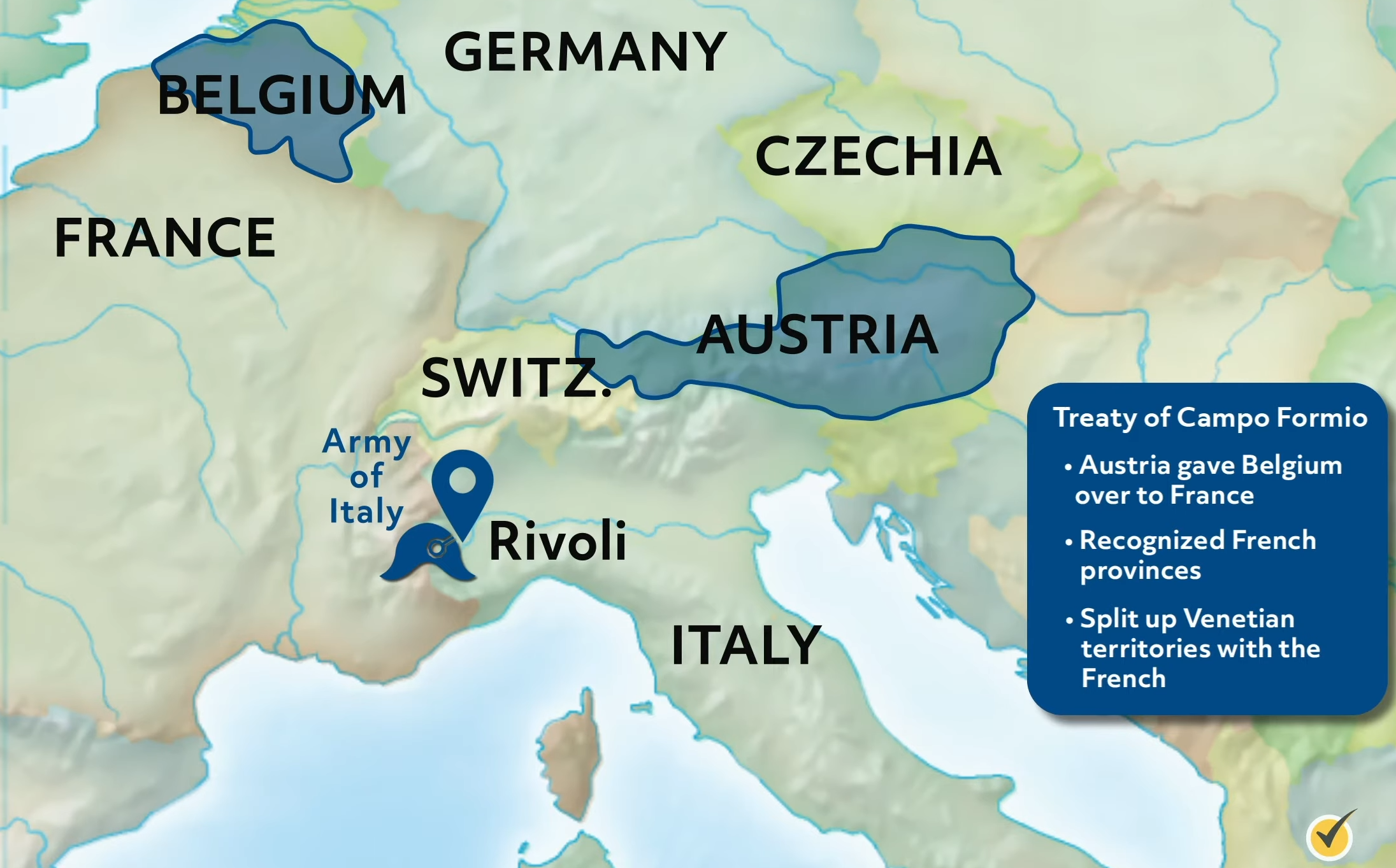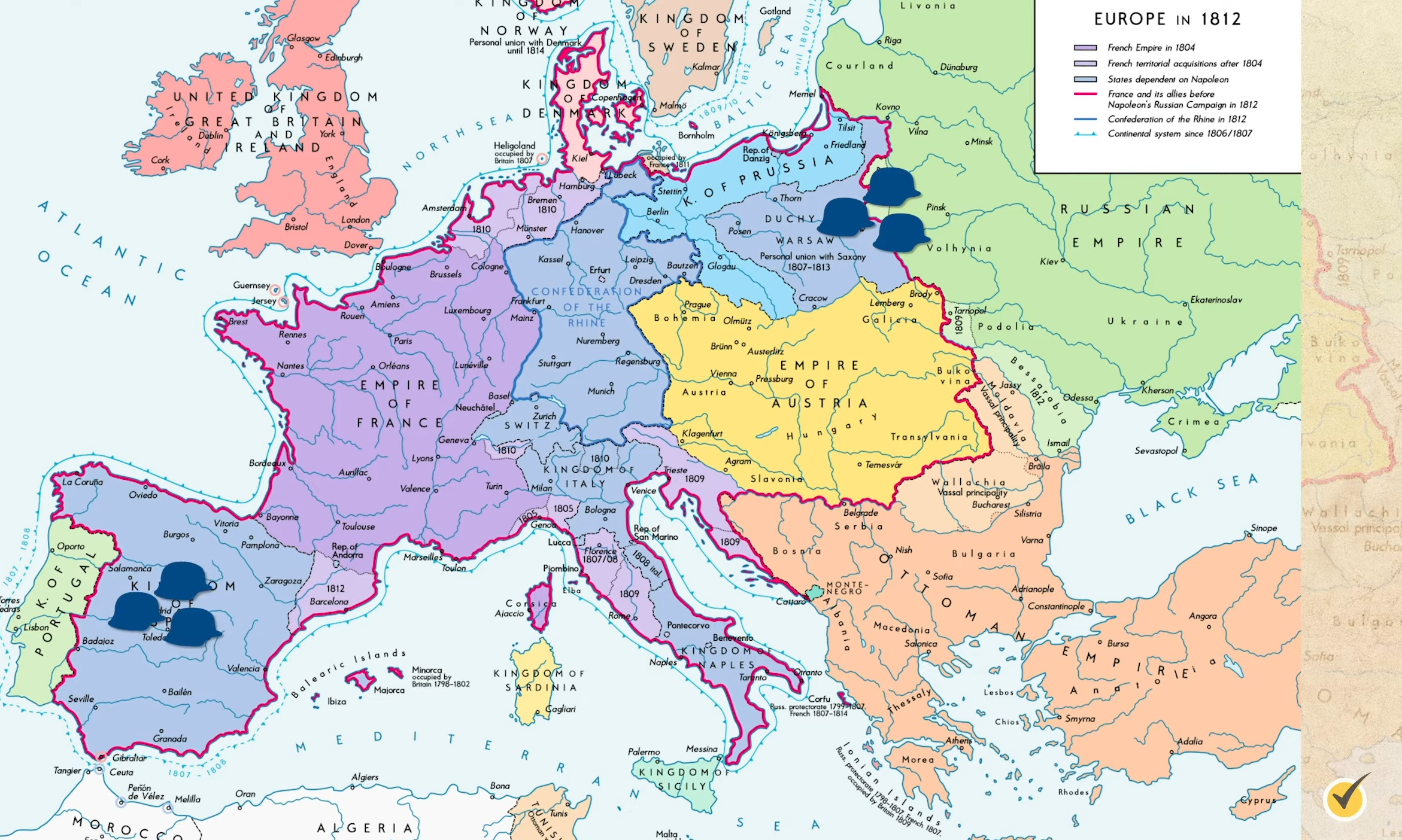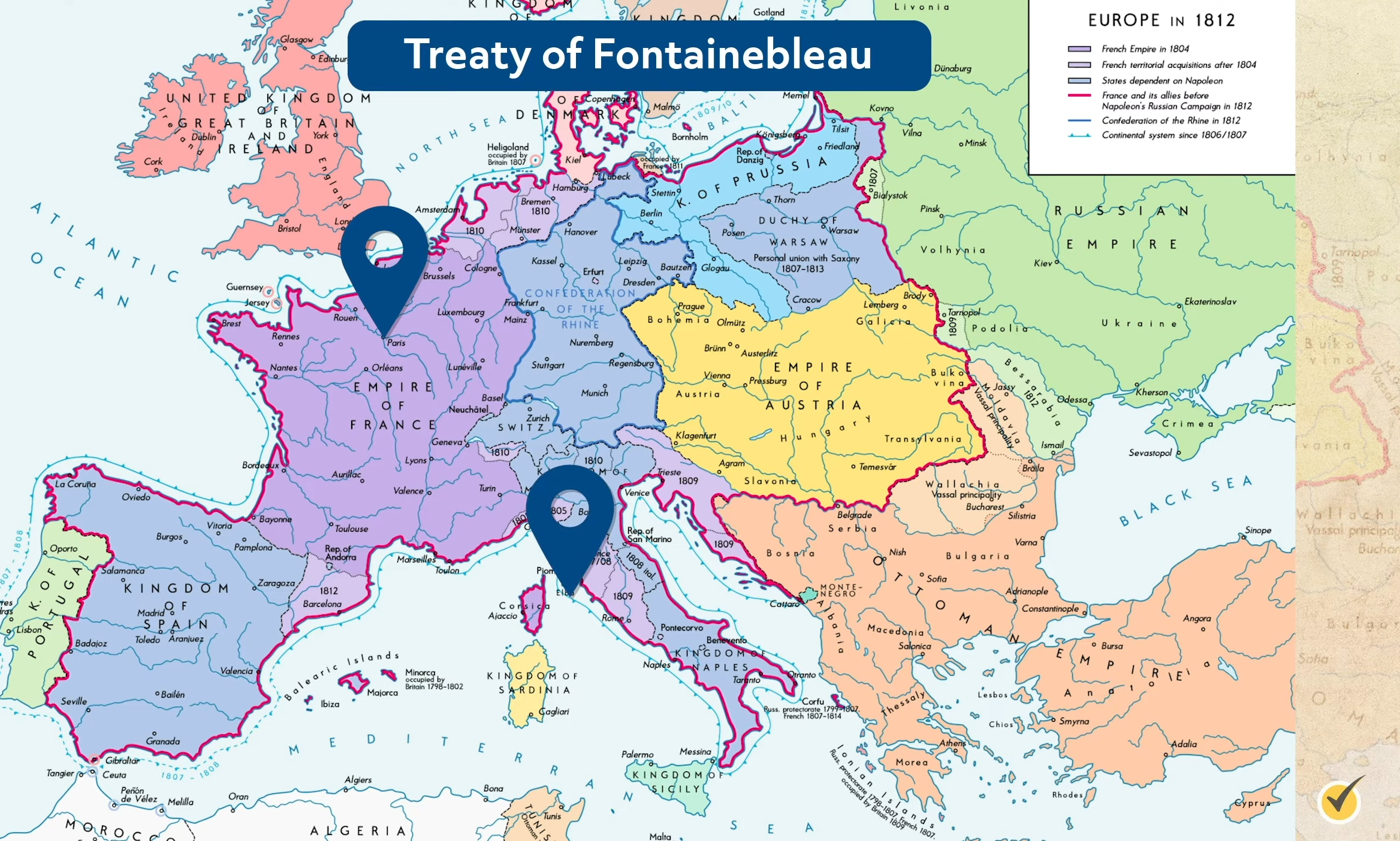
Hi, and welcome to this review of Napoleon Bonaparte! In this video, we’ll look at Napoleon’s rise to power and his role in the French Revolution.
Early Life and the French Revolution
Born in Corsica in August 1769, shortly after it became a French possession, Napoleon left the island at the age of nine to become a student in France. By 1788, after military education in Paris, he was posted to Auxonne, where he became a protégé of Baron du Teil. du Tiel was an artillery expert who taught Napoleon everything he knew about military history and strategy, as well as the decisive role that artillery could play in battle.
The following year, in 1789, the French Revolution began. In Paris, the royal Bastille fortress fell to a popular uprising on July 14th, and on August 27th, the National Assembly issued the Declaration of the Rights of Man and Citizen. This declaration stated that the rights of man should be universal. After being convicted of conspiracy with foreign powers, King Louis XVI was guillotined in Paris in January 1793.
In April, the Committee of Public Safety was formed as the new provisional government in France. This government pledged to assist “all peoples who rise against their rulers” which did not sit well with the other monarchies of Europe. Anticipating attacks, almost every major European power declared war on France, with Austria and Britain among them. This sparked not only invasions but also a dangerous civil war between royalists and republicans.
Rise to Prominence
The Siege of Toulon
One city where the royalists were rising in power was the important French naval base of Toulon, which came under the control of a British-led force in 1793. The French-Republican efforts to retake that city gave Napoleon a chance to use his military knowledge and distinguish himself.
In July of that year, he had been assigned to the army of General Carteaux to turn back the royalist tide sweeping the south of France. That same month, he wrote a pro-Republican pamphlet entitled Supper at Beaucaire which found its way to Augustin Robespierre, a powerful political figure close to Toulon. Robespierre, impressed with Napoleon’s passion for revolution, made Napoleon senior gunner in the French forces attacking Toulon. In the process of helping the French recapture the city in December 1793, Napoleon came into heated rivalry with a politician on location named Paul Barras.
In Paris, Augustin’s older brother Maximilien Robespierre launched the Reign of Terror, executing people at the guillotine who were suspected to be anti-government. Barras and other leaders had had enough of this Reign of Terror and succeeded in arresting and executing Robespierre, as well as his followers.
13 Vendémiaire
Napoleon was called back to Paris to defend the government as another royalist uprising erupted. Through strategic commanding and deployment of cannons on city streets, he helped eliminate the uprising in 1795. He then secured the authority of the new French government with its five members, one of whom was Barras.
As reward for his services in Paris, Napoleon was named commander of the French army at the Italian front, otherwise known as the Army of Italy. Moving quickly, he struck northeast and began pressing the Austrians and their allies towards the Alps. This led to an epic confrontation at Rivoli in January 1797, where the French defeated the Austrians. Under the Treaty of Campo Formio, Austria gave Belgium over to France, recognized French provinces in northern Italy, and split up Venetian territories with the French.

When Napoleon returned to France in 1799 after an expedition to Egypt had gone sour, the French government was in shambles. Britain, Russia, and Austria had all declared war on the country. Taking advantage of this disarray and the loyalty of his troops, Napoleon helped orchestrate the coup of 18 Brumaire, in November 1799. This coup ejected Barras from office, instituted a new constitution, and made Napoleon first of a group of three consuls running the government.
The Consulate and Early Reforms
Napoleon now began to set in motion some of his most impressive accomplishments off the battlefield
The Concordat of 1801
In that same year he signed a Concordat with the Vatican in an attempt to heal the wounds of the revolution’s effects on the papacy. This concordat stated that the French government was to pay salaries to the Catholic clergymen in France whose properties had been taken from them during the Revolution.
The Napoleonic Code
He launched a series of committees, which over several years saw the creation of the Civil Code of the French People. This code clarified the laws of the French Revolution, and was better known as the Napoleonic Code. It took effect in France and in French-controlled territories including Belgium, Luxembourg, and parts of Germany and Italy.
Emperor of France
Enforcing these reforms, however, required the authority of a dictator. On May 18th, 1804, Napoleon orchestrated a national vote that proclaimed him emperor. He followed up by bringing the Pope to Paris for his imperial coronation in December, where Napoleon crowned himself and then crowned his wife Josephine.
The Grande Armée and Continental Domination
This coronation prompted an anti-French alliance called the Third Coalition, which included Britain, Austria, and Russia, among others. Though the Russians and the Austrians marched forward with roughly half a million men, Napoleon had the machinery of the French Empire under his full control and could swing it into action with devastating effect. Famously stating “I am the French Revolution,” he assembled an army of over 200,000 near the Rhine River and marched east, winning a victory at Ulm. He pressed on to the vicinity of Austerlitz, where the Austrian and Russian forces retreated in 1805. The Third Coalition eventually collapsed.
Decline and Exile
But tensions with the Russians in particular were never fully resolved. In what Tsar Alexander I saw as a direct threat, Napoleon was collecting French troops in western Poland, right on the Russian Empire’s western border. Both sides armed for the ultimate confrontation, and by May of 1812, Napoleon had 650,000 troops under his command, ready to attack. When the French attack finally came the next month, thousands of Napoleon’s troops were already tied up in a war with Spain, and the army that advanced on Moscow became notoriously difficult to supply.

Due to effective defensive fighting by the Russians and the harsh Russian winter, the fighting strength of Napoleon’s army shrank drastically. In February 1813, Russia and Prussia entered into an alliance against Napoleon, which the Austrians would eventually join.
Through a grueling campaign that stretched across Germany and France, these Allies eventually chased Napoleon away from Paris and captured the French capital in March 1814. The Treaty of Fontainebleau, signed in April, exiled him to the Mediterranean island of Elba.

The Hundred Days and Final Defeat
Napoleon escaped from Elba and reached France in 1815, quickly re-taking control of the government. Napoleon quickly implemented a plan to target the only two enemies already in the field: the British Duke of Wellington and the Prussian Field Marshal Gebhard von Blücher. The French, 125,000 strong, sprung a surprise attack on the Allied commanders in June 1815. As Wellington escaped north to a favorable position in the vicinity of Waterloo, Blücher remained close enough to support his allies. This move turned a near Allied defeat into a victory on June 18th as Napoleon was caught off guard. After this defeat, Napoleon chose to step down, for the second and final time. He was shipped to exile on the rocky South Atlantic isle of St. Helena, where he died in 1821.
Review
Ok, before we go, let’s go over a quick review question:
Which of the following was an accomplishment of Napoleon?
- Supervising the creation of the Civil Code of the French people
- The French military defeat of large Austrian and Russian armies at Austerlitz
- The signing of a concordat with the Catholic papacy in 1799
- All of the above.
I hope this review was helpful! Thanks for watching, and happy studying!
- “French Revolution.” 2023. Wikipedia
- “Napoleon.” Wikipedia
- “Thermidorian Reaction.” 2020. Wikipedia
- “13 Vendémiaire.” Wikipedia
- “Treaty of Campo Formio | France-Austria [1797] | Britannica.” n.d.
- “Coup of 18 Brumaire.” Wikipedia
- “Concordat of 1801 | French Religious History | Britannica.” 2019
- “How Napoleon Introduced a Legal System That Still Exists.” ThoughtCo. July 31, 2019
- “The Execution of the Duke D’Enghien.” n.d. Napoleon & Empire. Accessed June 5, 2023
- “German Campaign of 1813.” 2022. Wikipedia
- “Battle of Paris (1814).” 2023. Wikipedia
- “Battle of Waterloo.” Wikipedia
- “Waterloo Campaign.” 2023

